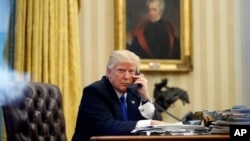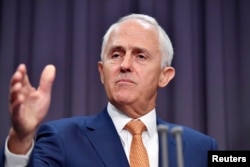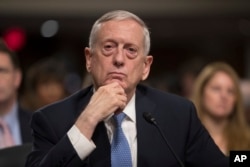It was expected to be a routine phone call between U.S. President Donald Trump and one of Washington's closest allies.
Instead, last Saturday's discussion between Trump and Australian Prime Minister Malcolm Turnbull reportedly became heated, spilling into a rare display of public diplomatic disagreement over a deal under which the U.S. would resettle refugees from Australia.
Though the incident is not likely to cause a major crisis in the U.S.-Australia relationship, it amounts to an unforced error for Trump and raises further questions about his management of crucial U.S. alliances in Asia, according to former U.S. defense officials, ex-diplomats and Asia analysts.
“It's simply hard to understand how pursuing a more antagonistic relationship with the Australian prime minister advances our national objectives,” said Abraham Denmark, who stepped down last month as U.S. Deputy Assistant Secretary of Defense for East Asia.
Many Asian leaders were already alarmed by Trump's willingness during the presidential campaign to question longstanding U.S. alliances with countries such as Japan and South Korea, which he said are not paying their “fair share” for U.S. protection. Trump's phone call with Turnbull now seems likely to intensify those worries.
“They're watching us very closely and there's a lot of concern among many of our allies that the president seems to see international relations and alliances as highly transactional,” said Denmark, a political appointee under President Barack Obama. “The question for them is ... what does the Trump administration expect from us?”
‘Worst deal ever’
The details about the phone call were first outlined in a Washington Post report late Wednesday.
In the conversation, Trump referred to the refugee agreement, reached under Obama, as the “worst deal ever” and accused Turnbull of trying to export the “next Boston bombers,” a reference to the Kyrgyzstan-born attackers who set off bombs during the 2013 Boston marathon.
The discussion was expected to last an hour, but ended after only 25 minutes, according to the report. Afterward, both leaders put their own spin on the conversation.
Turnbull told reporters late Thursday the phone call was “frank and forthright.” He said the U.S.-Australia relationship remains “very strong,” but insisted he will “stand up for Australia in every forum — public or private.”
Trump, attending a national prayer breakfast, addressed the issue indirectly. “It's time we're going to be a little tough, folks. We're taken advantage of by every nation in the world virtually. It's not going to happen anymore,” he said.
Uncommon event
While it's not unusual for allies to disagree, this dispute is unusual because it occurred publicly, at the beginning of Trump's presidency, and in such a public way, says Mintaro Oba, a former U.S. diplomat in Asia.
“Points of tension sometimes happen in alliances, but generally diplomats take a lot of care to resolve those disagreements through private channels first, to avoid escalating it to the highest level,” Oba added.
Any rift between the U.S. and its Asian allies could be patched up by new Defense Secretary James Mattis, who is visiting South Korea and Japan this week, in part to soothe those countries' concerns about U.S. support.
During his meetings with security officials, Mattis is likely to be questioned about Trump's repeated threats to pull U.S. troops out of Japan and South Korea unless Seoul and Tokyo substantially increase their contributions to the deployment costs.
But Mattis' message of reassurance risks being undermined by Trump's unpredictability, says Oba. “Trump is thinking in terms of The Art of the Deal [the title of one of Trump's books], and he values unpredictability and tension within his internal staff. But what our allies value is commitment, especially in the face of the tremendous security challenges they face.”
Despite the uncertainty, reaction from Asian leaders so far has been mostly restrained, as they wait to see whether President Trump will follow through on his campaign promises or dial back his rhetoric.
Japanese Prime Minister Shinzo Abe, who is set to meet with Trump in Washington next week, is looking at Trump "not with negative emotion such as anger and fear, but with tremendous curiosity," according to a senior Japan administration official in Tokyo.
"Shinzo Abe is not paying so much attention to what the POTUS [president of the U.S.] says. Verbal assault is one thing, whether tangible deeds follow is quite another, and it is too early to come to any sort of judgment," the official said.
‘Bump' in the road?
It's still unclear how Trump's dispute with Turnbull will affect U.S. ties with Australia. But it isn't likely to do long-term damage, says James Schoff, a senior fellow at the Carnegie Endowment, who points out that the two allies cooperate on a range of issues from maritime security to global counterterrorism efforts.
"This could end up being a tiny bump in the road. I mean, I'm not aware of any kind of long-held resentment Trump has against Australia," Schoff says. "But I worry that over time if this continues it will seriously undermine our alliance relationships in Asia."
Though the phone call could soon be forgotten or dismissed as a mistake by a new administration that does not yet have all its senior cabinet positions filled it could also have long-lasting effects, Schoff says.
"But I think the White House is going to discover that in foreign policy, resentments and memories are very long-lasting," he says. "It takes a long time to build up trust and good will, and it's relatively easy to tear down."
VOA's Steve Herman contributed to this report.






